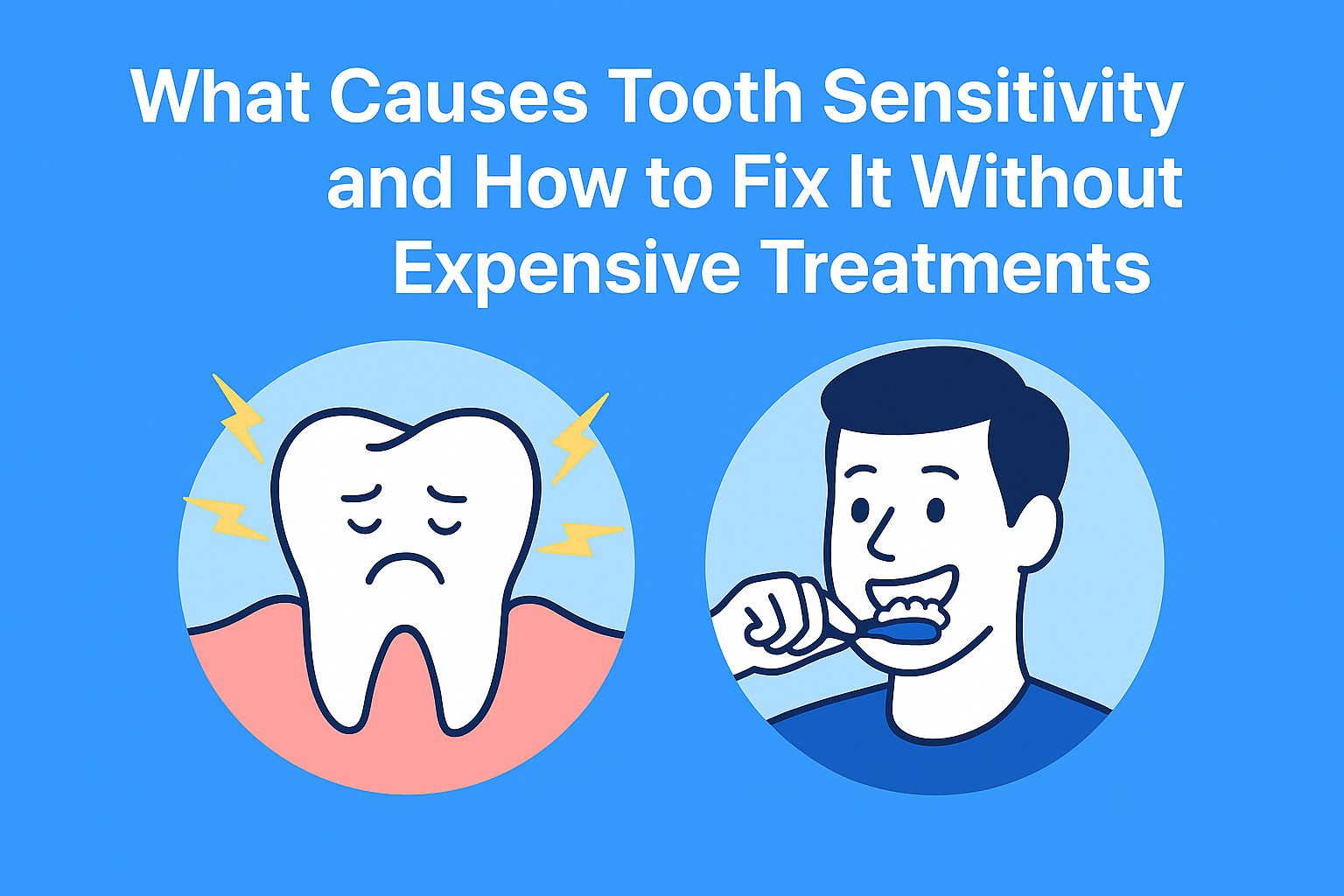What Causes Tooth Sensitivity and How to Fix It Without Expensive Treatments
- Home
- Blog
- Preventive Care
- Preventive Care
- Comments
What Causes Tooth Sensitivity and How to Fix It Without Expensive Treatments
Do your teeth sting when you sip something cold or bite into a sweet treat? That sharp, sudden pain is called tooth sensitivity, and it's one of the most common dental complaints — affecting both young adults and seniors alike.
The good news? Most causes of sensitivity are treatable, and you don't always need costly procedures to find relief. At Dentinix, we help patients uncover the root cause of their sensitivity and create simple, effective solutions that fit their needs and lifestyle.
Tooth Sensitivity: What You Need to Know
What causes tooth sensitivity?
How to know if it's sensitivity or a bigger problem?
What are simple fixes that actually work?
How does Dentinix approach sensitivity treatment?
When should you seek professional help?
🦷 What Causes Tooth Sensitivity?
Tooth sensitivity occurs when the protective enamel or gum tissue wears away, exposing the underlying dentin — which contains tiny tubules that lead to the nerve.
Common Causes Include:
Aggressive brushing with a hard-bristle brush
Acidic food and drinks (like soda, citrus fruits, or vinegar)
Gum recession from age, gum disease, or poor brushing technique
Tooth grinding (bruxism), which wears down enamel
Cracks or chips in the tooth
Old or leaking fillings
Whitening products, especially over-the-counter ones
Post-dental procedure sensitivity (usually temporary)
How to Know If It's Sensitivity — Not a Bigger Problem
Understanding the difference between sensitivity and more serious dental issues helps you know when to seek professional care.
Sensitivity Typically Feels Like:
Short, sharp pain triggered by cold or hot foods and drinks
Discomfort from sweet or sour items
Pain during brushing or flossing
Discomfort from cold air hitting your teeth
Warning Signs That Need Professional Attention:
Pain that lingers after the trigger is removed
Throbbing or constant pain
Pain localized to one specific tooth
Swelling or visible damage to teeth
Pain that wakes you up at night
However, if the pain lingers, becomes throbbing, or is localized to one tooth — it may signal a deeper issue like a cavity or cracked tooth.
Dentinix Sensitivity Check: What We Look For
At Dentinix, we assess the full picture to determine the best treatment approach.
Our Assessment Includes:
Enamel erosion patterns
Gum health and recession
Bite alignment and signs of grinding
Tooth structure and filling integrity
Based on what we find, we recommend the most conservative solution first — and escalate only if necessary.
Simple Fixes for Tooth Sensitivity That Work
Most sensitivity can be managed with simple, cost-effective solutions that you can start implementing today.
✅ Switch to a Desensitizing Toothpaste
These contain ingredients like potassium nitrate or stannous fluoride that block pain signals
Use it twice daily — not just once in a while — for lasting relief
May take 2-4 weeks to see full results
✅ Use a Soft-Bristle Brush + Gentle Technique
Brushing too hard wears away enamel and irritates gums
Use circular motions and don't apply too much pressure
Consider an electric toothbrush with pressure sensor
✅ Cut Down on Acidic Foods
Frequent exposure to acids weakens enamel
Rinse with water after consuming citrus, soda, or wine
Wait 30 minutes after acidic foods before brushing
Professional Treatments Available at Dentinix
Fluoride Treatments (In-Clinic): Professional fluoride applications help strengthen enamel and reduce sensitivity over time
Night Guard for Bruxism: If you grind your teeth in your sleep, a custom-fitted night guard protects your enamel and relieves jaw stress
Gum Recession Coverage or Bonding: For exposed roots, bonding or minor gum procedures can reduce sensitivity and protect the area
Bonus Tip: Don't Skip Dental Visits
The sooner we detect the source, the faster we can treat it — and often without major intervention. Waiting too long can turn a minor sensitivity into a cavity, fracture, or infection.
🦷 Why Dentinix for Sensitivity Management?
Our approach to sensitivity treatment focuses on conservative, effective solutions that address the root cause.
The Dentinix Difference
We don't rush into drilling or procedures
We use digital diagnostics to locate the exact source of the problem
We create personalized, layered treatment plans
We always start with non-invasive options first
We educate you on home care changes to support long-term relief
FAQs: Tooth Sensitivity
How long does it take for desensitizing toothpaste to work?
Most people see improvement within 2-4 weeks of consistent use.
Can sensitivity go away on its own?
Sometimes, but it's better to address the underlying cause to prevent it from returning.
Is tooth sensitivity a sign of a cavity?
Not always, but persistent sensitivity should be evaluated by a dentist.
Can whitening cause permanent sensitivity?
Usually temporary, but overuse can cause lasting damage. Always follow instructions.
Sensitivity isn't just annoying — it's a signal. Mild tooth sensitivity is common, but persistent sensitivity is your mouth's way of asking for help. Whether it's a toothpaste switch or a protective in-clinic treatment, the right approach can make all the difference. At Dentinix, we believe relief shouldn't have to be expensive — just effective and customized.
Ready to Address Your Tooth Sensitivity?
📍 Visit us at Dentinix, Sarjapur Road, Bangalore
🌐 www.dentinix.com
📞 Call us to schedule your sensitivity consultation and discover simple, effective solutions for lasting relief

